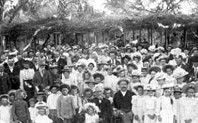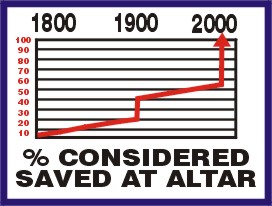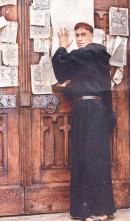|
Repent & Baptize "Repent
and be baptized, every
one of you, in the name of Jesus Christ for the forgiveness of your
sins." Acts 2:38 How The After Meeting evolved to Today's Altar Call
As early as 1741, Eleazer Wheelock, a Congregational Minister, had to stop preaching because he was drowned out by the "distress and outcry" of the congregation. "Not being able to finish his sermon, with great apparent serenity and calmness of soul, he called to the distressed, and desired that they gather themselves together in the body of the seats below."(The front seats) 23This is perhaps the beginnings of the modern "altar call". But notice Wheelock only shared the Gospel and prayed for the penitents. He never presumed to have them repeat a formula "sinner's prayer." Many devices were called
"New Methods." "Some, instead of
using the simple mourner's bench, employ the raising of hands; rising
up in the congregation; kneeling at seats;coming forward and giving
the hand to the minister...some prefer the "inquiry room",
where they have the exercises of prayer, and the like." 24
Praying for penitents, in itself, was not considered a "New Method."
It was common with Whitefield and Wesley. Any who sought prayer, were
welcome to see them after the service. They prayed that penitents would
yield themselves fully to God, but never led them in a formula "salvation
prayer." As the "altar call'' became more common, the numbers that came forward increased. During the 1800's, the act of going forward to receive prayer was never considered the means of salvation. But through the changing of generations, the Biblical understanding of the sovereignty of God was slowly replaced by a modern "quick-fix" mentality. The "struggle of faith" and "praying through" was replaced by signing your name on a decision card. Billy Sunday started out like D.L. Moody, with the emphasis on individual counseling in the after meeting. But by the end of his career, there was no pretense of objectivity. Christian Disneyland had begun. Early reports in the 1800's suggested that only 10% of the persons who went forward in an altar call were "hopefully saved." As the decades past, the percentage grew to as much as 30%. Then, much later, the number might be 50%. Until finally, by 1918, the newspapers reporting that everyone who "hit the sawdust trail" to shake Billy Sunday's hand were saved. The final results issued by the Sunday organization were more credible, based as they were on decision cards. But D.L. Moody's church, after a 4 month internal audit, found there were only 14 verifyable conversions out of the 508 decision cards sent to Moody's church. (That's 3%) 25
Since God doesn't change, only the definition of what it meant to be"saved" was slowly changing. By 1918, a newspaper reported, " CONVERTS RUSHED TO GRASP HANDS OF BILLY SUNDAY." According to the media, "Publicly acknowledging their belief in Jesus Christ as their savior, and expressing their repentance for sin, 425 men, women and children of all ages and types, surged down the sawdust trail to the platform at the tabernacle last night to grasp the hand of Billy Sunday and to be enrolled as professing Christians." 100% of the people who went forward were considered "saved" because of their singular act and supposed mindset. Lost in the frenzy was the Biblical teaching of the sovereignty of God and the born-again experience. The terminology "hopeful conversion" was lost by the end of Billy Sunday's career. Within a 39 year span, "hopeful conversions" were replaced with "X number got saved." "I Was a Spiritual Abortionist" The road to an evangelist's recovery starts with admission of guilt. I am responsible for the same excesses and assumptions made by Billy Sunday and Billy Graham. I stand before the world with head bowed in shame and say, "I was a spiritual abortionist." I led people in a salvation prayer without explaining the importance of repentance, and explaining what repentance is. Had God given them the understanding so they'd be willing to sell everything they depended on to purchase the Pearl Of Great Price? (Mat 13:46) Had God given them revelation to see they had enough building materials to build what God wanted them to build or enough armies to fight the battles that God wanted them to fight. (Luke 14:28-31) These would have been evidence of saving faith. I didn't do what every evangelist before Sunday did - give them time to pour out their sins before God; to repent fully before looking up to Him for the peace that accompanies salvation. And I led them in a repeat-after-me "salvation prayer" that would have come spontaneously from a regenerated heart. Using the scripture, "now is the day of salvation" as an
axiom for immediate salvation for everyone is worse than simplistic
- it's deadly. Many converts - including Luther, Whitefield and Wesley
say that even though they did everything they knew to please God, they
weren't saved until God in His mercy gave them the grace to be saved.
Luther repented of "dead works." (Hebrews 6:1) Going forward
in an altar call is just as much a dead work as paying an indulgence.
Saying a formula "salvation prayer" is just as much a dead
work as lighting a candle, or making a sign of the cross. None of these things can save. Luther's
"struggle of faith" ended only by the grace of God.
Luther exalted with revelation knowledge: Every generation has idols they cannot see. Even King David didn't see his household idols for what they were.(1 Samuel 19:13)
Whitefield and Wesley prayed for God to save them for years. The methods of their "Holy Club" were austere even by Puritan standards. Whitefield was discouraged when a fishwife in prison received freely what he had striven years to achieve. But at last, God saved him. "I found and felt in myself, that I was delivered from the burden that had so heavily oppressed me. The spirit of mourning was taken from me, and I knew what it was to rejoice in God my Savior." 27 John Wesley's "struggle of faith"
took much longer than Whitefield's. Ordained in the Church of England,
and returning by boat after serving as a missionary, Wesley realized
the wretched condition of his soul. "I went
to America to convert the indians; but O! who shall convert me?"
28 Modern evangelism denies the sovereignty of God by exalting the altar call and sinners prayer as a means of God's grace. How many thousands of "sinners prayers" do you think Luther, Whitefield and Wesley made? Are we wiser than these great men of God? Or are we not like the pot who questions the Potter? Who knows the reasons why God withholds salvation till exactly the right moment? Could He not have a bigger plan than Billy Sunday's "Box Scores?" Is it not likely that most sinners need to "repent of dead works" by the illumination of God? One cannot repent without faith, which is a gift of God. "For by grace are ye saved through faith; and that not of yourselves: it is the gift of God: Not of works, lest any man should boast." Eph 2:8-9
The characters of these men were made
great through their "struggles of faith." Birthing is not
always a quick, or easy affair. Let's agree with James, "...the
trying of your faith worketh patience...let
patience have her perfect work, that ye may be perfect and entire..."
James 1:3-4 Perhaps the reason
there are so few great men of God today is because most came by C-section.
"Render therefore unto Caesar the things
which are Caesar's; and unto God the things that are God's."
Matt 22:21 (He said with tounge in cheek.) |



